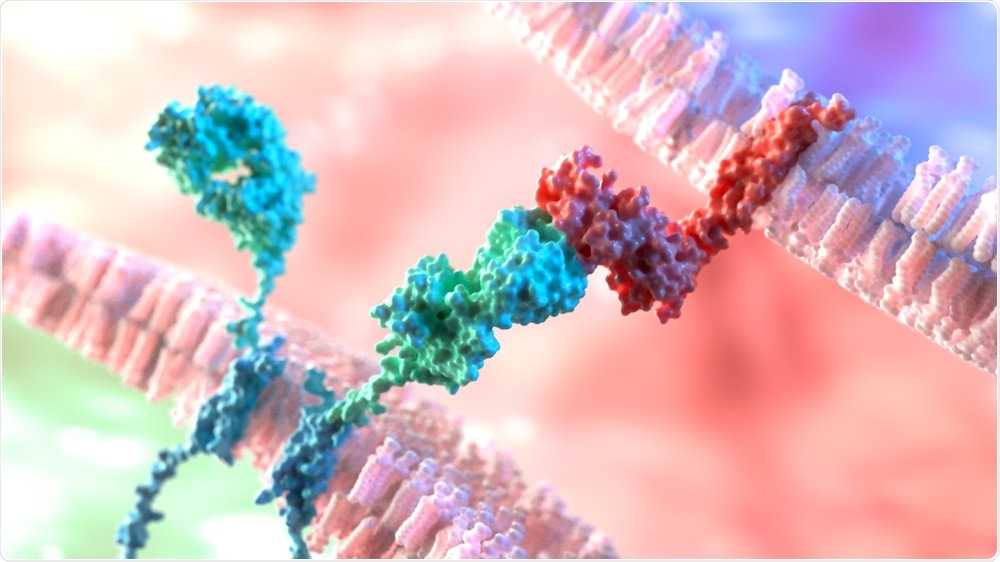An interview with James Flanaghan at SfN 2018, discussing the uses of DREADDs in neurobiological research and the advantages of water-soluble ligands.
What are DREADDs?
DREADDs are “Designer Receptors Exclusively Activated by Designer Drugs”. They are synthetic GPCRs which have been engineered to lack affinity for their endogenous ligands and to confer efficacy to an otherwise physiologically inert compound.

Alpha Tauri 3D Graphics | Shutterstock
How are DREADDs used to study GPCR signaling in the brain?
You can use DREADDs to selectively control different GPCR signaling pathways within neurons. You can control Gq Gs and Gi signaling pathways and modulate neuronal activity non-invasively in vivo.
Which ligands does Hello Bio offer for DREADDs?
There are a growing number of DREADD ligands, including specific ligands that are only available from Hello Bio. We sell a prototypical actuator for DREADDs which is called Clozapine N-Oxide, or CNO. We recently released a water-soluble version of CNO, which provides many advantages for researchers.
We provide DREADD Agonist Compound 21, a compound called Perlapine and Salvinorin B for inhibitory DREADDs. We also manufacture some novel DREADD ligands, which we created in collaboration with the NIH and these are water-soluble too.
What advantages do the new water-soluble DREADD ligands offered by Hello Bio provide over traditional, basic ligands?
Until recently, CNO (freebase) was the most widely used compound to activate the excitatory hM3Dq DREADD and the inhibitory hM4Di DREADD. However, it’s water-solubility can be unpredictable, and it can be difficult to handle in solution, precipitating out in certain situations.
Water-soluble DREADDs offer researchers more flexibility – many scientists prefer to use water as their solvent, as they do not want the unwanted effects of DMSO or ethanol in their biological experimental systems. Our water-soluble CNO dihydrochloride is easy to solubilize and handle and does not precipitate out of aqueous solution, which is highly advantageous for use in biological assays.
In addition, researchers can access some very detailed information on the stability and solubility of these novel water-soluble ligands as our chemists have carried out extensive testing to assess these products. The data can help researchers make an informed decision regarding which ligand to choose for their particular assay or experiment, as described on our website.
What responses have you had from scientists?
We've had very positive feedback across all of our compounds, including the novel ones we've developed. We spend a lot of time developing stability and handling guidelines to give to researchers, and I think this really helps when using these compounds.
Why did Hello Bio choose to attend Neuroscience 2018, and what have you learned from this year’s conference?
We absolutely love saying hello to our customers and colleagues, and SfN is a great place to do that. It’s also a conference where we can introduce ourselves to researchers that maybe haven’t heard of our exciting range, and our low price philosophy – we try and make our products as affordable as possible, and offer them at around half the price of other suppliers, whilst still maintaining that all-important quality.
It's also a great forum for us to see what new products and research are being talked about. There's been a fantastic amount of high-quality research presented here, particularly on DREADDs, and I think the popularity of these compounds will continue to rise.
What does the next year look like for Hello Bio?
We're always developing new products and looking to add as many useful products to our catalog as possible. This process usually involves talking to researchers at conferences like SfN and then taking what we’ve learned back to our labs for development.
Where can readers find more information?
About James Flanaghan

"I am Head of Product Development at Hello Bio, which is a fun and dynamic job. My job involves staying up to date with what researchers are currently up to and how they’re using our products. I find it very fulfilling to know that our company supports cutting-edge research by providing high-quality products."
About Hello Bio
Hello Bio was founded by a team of experienced scientists and chemists who genuinely want to support life science research. Our aim is to manufacture and supply a range of high-quality life science tools at prices so low that as many researchers as possible will be able to afford them.
